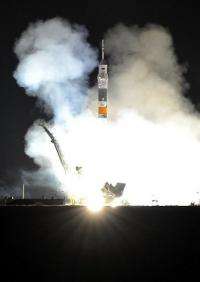Russian company to build 'space hotel' with home comforts

A Russian company on Wednesday announced plans to launch a comfortable space hotel for tourists who up to now have shared cramped accommodation with astronauts, the RIA Novosti news agency reported.
The company, Orbital Technologies, plans to launch the first module of the hotel in 2015-16, its chief executive Sergei Kostenko told RIA Novosti at a presentation.
A cosy fit, the first module will measure just 20 cubic metres (706 cubic feet) and have four cabins, designed for up to seven passengers, who would go into orbit using the Soyuz shuttle, Kostenko said.
Up to now space tourists, who have included the Canadian founder of the Cirque du Soleil, Guy Laliberte, have squeezed into the International Space Station (ISS) along with cosmonauts and animal life including fruit flies.
The new hotel will offer more comforts than the ISS, Kostenko said.
"Our planned module inside will not remind you of the ISS. A hotel should be comfortable inside, and it will be possible to look at the Earth through large portholes," Kostenko said, calling it a "cosmic hotel".
The space hotel will be aimed at wealthy individuals and people working for private companies who want to do research in space, Kostenko said.
The space tourism programme was halted earlier this year as the crew numbers on the ISS increased, leaving no room for extra passengers.
Kostenko said that the project has "found Russian and American investors, and we are talking about hundreds of millions of dollars", without elaborating.
"At the moment, the project is already at the design stage," he said.
The space hotel would be built by Russian spacecraft manufacturer Energia, the company's website says. It would follow the same orbit as the ISS.
Kostenko told RIA Novosti that "a number of agreements on partnership have already been signed" with Energia and the Russian space agency.
The company's website cites the deputy head of Russian space agency Roskosmos, Vitaly Davydov, as saying that "the suggested project is extremely interesting".
(c) 2010 AFP
















